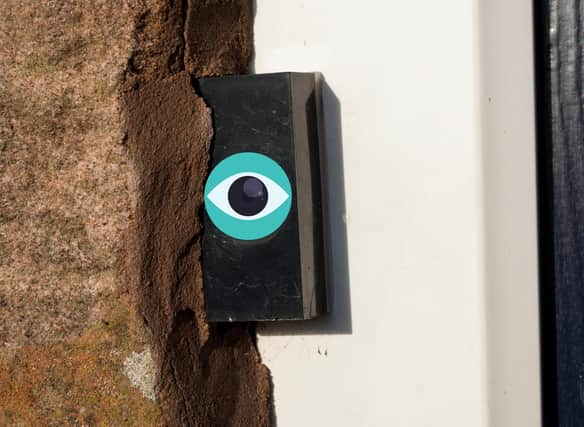Ring doorbell: Is the smart camera doorbell a breach of privacy? UK Ring doorbell court case, explained


A court case in England has led to concerns among owners of popular smart doorbell devices such as Ring Doorbells that they may be susceptible to hefty fines if neighbours assert that they are a breach of privacy.
The outcome of a ruling over a man’s use of Ring home surveillance and security devices, which possess cameras and motion-sensors intended to catch loiterers and monitor home safety, has seen him face a potential £100,000 fine for breaching UK data protection regulations and harassment of his neighbour.
Advertisement
Hide AdAdvertisement
Hide AdHere’s everything we know about the smart doorbell court case – and if UK owners of Ring doorbells and personal CCTV devices could face similar fines as a result.
What are Ring Doorbells?
Developed by Ring LLC, a home security technology company owned by Amazon, Ring Doorbells are wifi-enabled smart doorbells intended to deliver an added layer of safety to home owners – with a camera installed on the doorbell to let owners screen visitors.
The devices have built-in motion detection and can be connected to existing doorbells through wiring or attached to doors as stand-alone video doorbell devices, with two-way talk letting home owners speak to those on their doorstep.
Such smart doorbell devices are popular in countries worldwide, with Ring aiming to reduce crime in local neighbourhoods with its own product and claiming to have seen a 55% reduction in crime in one US area over a seven month period.
Advertisement
Hide AdAdvertisement
Hide AdAmazon has sold millions of the doorbells since it bought the company in a multimillion pound acquisition in 2018.
But the devices have come under enhanced scrutiny over the last few years, with privacy campaigners warning of the dangers of using smart doorbells to home owners, neighbours and the public after Ring security devices were hacked.
What is the UK Ring doorbell court case?
An owner of a Ring doorbell may be forced to pay up £100,000 in fines after a neighbour brought a court case against his use of the smart video doorbell, claiming that it encroached on her own privacy and kept her under surveillance.
Dr Mary Fairhurst of Thame, Oxfordshire, said she was eventually forced to leave her home due to the presence of the personal CCTV devices and ensuing conflict with her neighbour.
Advertisement
Hide AdAdvertisement
Hide AdHer neighbour Jon Woodward had a Ring doorbell attached to the front door of his home in addition to a number of home security video devices set up around his home.
The Ring doorbell UK court case was brought to a conclusion on Wednesday as Judge Melissa Clarke said that Mr Woodward’s use of the smart doorbell device and other personal CCTV items had breached data protection laws.
According to the Oxford County Court case judgement, Mr Woodward had mounted several audio-visual surveillance devices facing out onto communal areas outside his and Dr Fairhurst’s home.
Mr Woodward now faces a compensation fine of up to £100,000 for a breach of the Data Protection Act 2018 in possessing photographs and video of Dr Fairhurst which have been ruled as her own personal data.
Could other Ring doorbell owners face similar fines?
Advertisement
Hide AdAdvertisement
Hide AdWhile the Oxford smart doorbell court judgement is not a binding decision set to reshape the law around the ownership of home security and personal CCTV devices, it could be cited in future cases brought by neighbours and members of the public wary of such devices, and the privacy implications of their location and usage.
The UK court case saw the defendant’s possession of Ring devices as going beyond the “legitimate interests” of data collection and personal protection of his home with a key focus on the audio captured by the devices.
Judge Melissa Clarke stated in the Fairhurst v Woodward judgement: “I am satisfied that the extent of range to which these devices can capture audio is well beyond the range of video that they capture, and in my view cannot be said to be reasonable for the purpose for which the devices are used by the Defendant, since the legitimate aim for which they are said to be used, namely crime prevention, could surely be achieved by something less.
“A great deal of the purpose could be achieved without audio at all, as is the case with the bulk of CCTV systems in use in public places in this country, or by a microphone that only picks up sound within a small diameter of the device."
Advertisement
Hide AdAdvertisement
Hide AdThe Judge continued: “That finding means that I am satisfied that the processing of such audio data by the Defendant as data controller is not lawful.”
A Ring spokesperson said: “We strongly encourage our customers to respect their neighbours' privacy and comply with any applicable laws when using their Ring device.
"We’ve put features in place across all our devices to ensure privacy, security, and user control remain front and centre – including customisable Privacy Zones to block out "off-limit" areas, Motion Zones to control the areas customers want their Ring device to detect motion and Audio Toggle to turn audio on and off."
A message from the Editor:
Thank you for reading this article. We're more reliant on your support than ever as the shift in consumer habits brought about by coronavirus impacts our advertisers.
If you haven't already, please consider supporting our trusted, fact-checked journalism by taking out a digital subscription.
Comment Guidelines
National World encourages reader discussion on our stories. User feedback, insights and back-and-forth exchanges add a rich layer of context to reporting. Please review our Community Guidelines before commenting.
